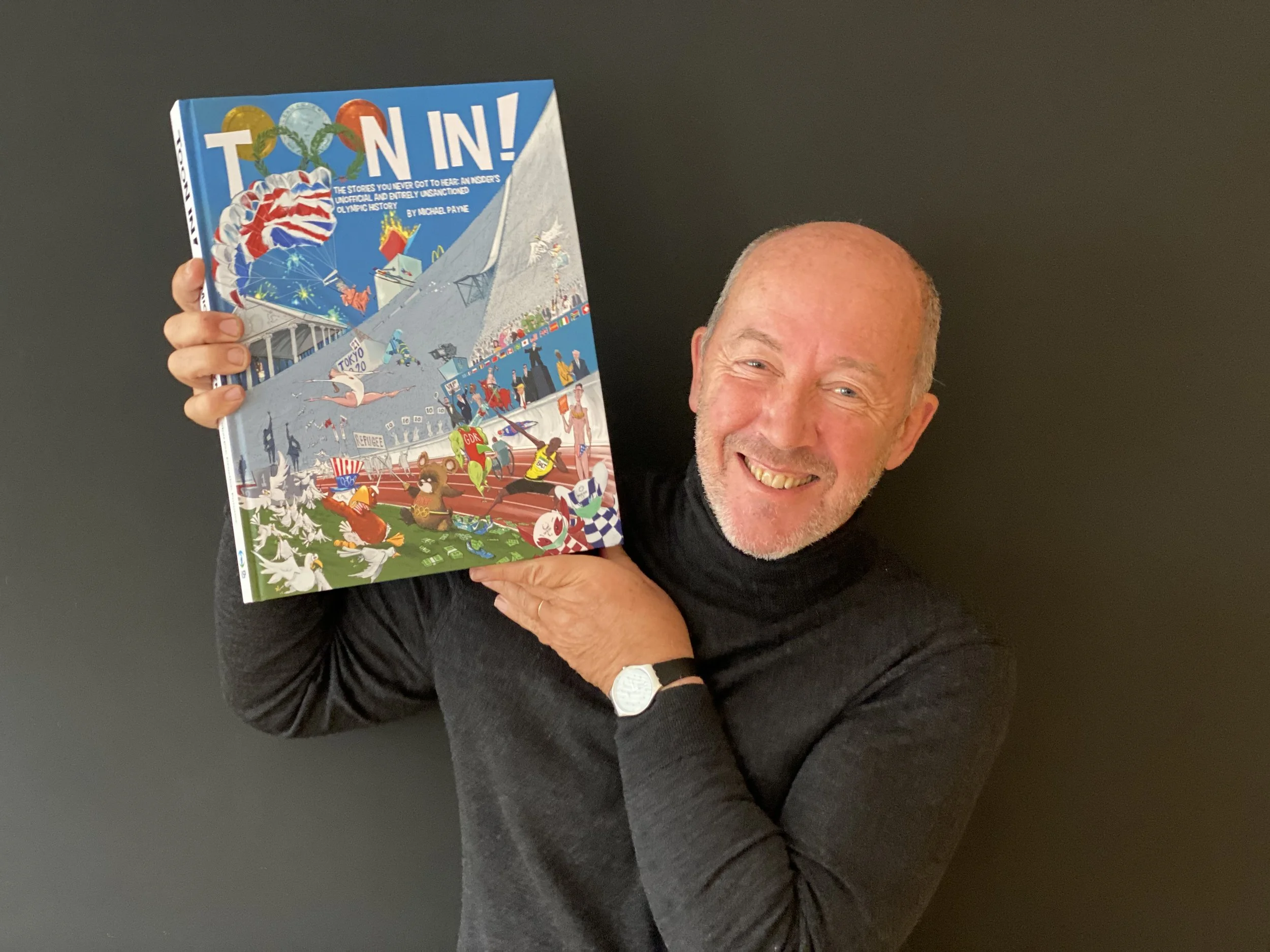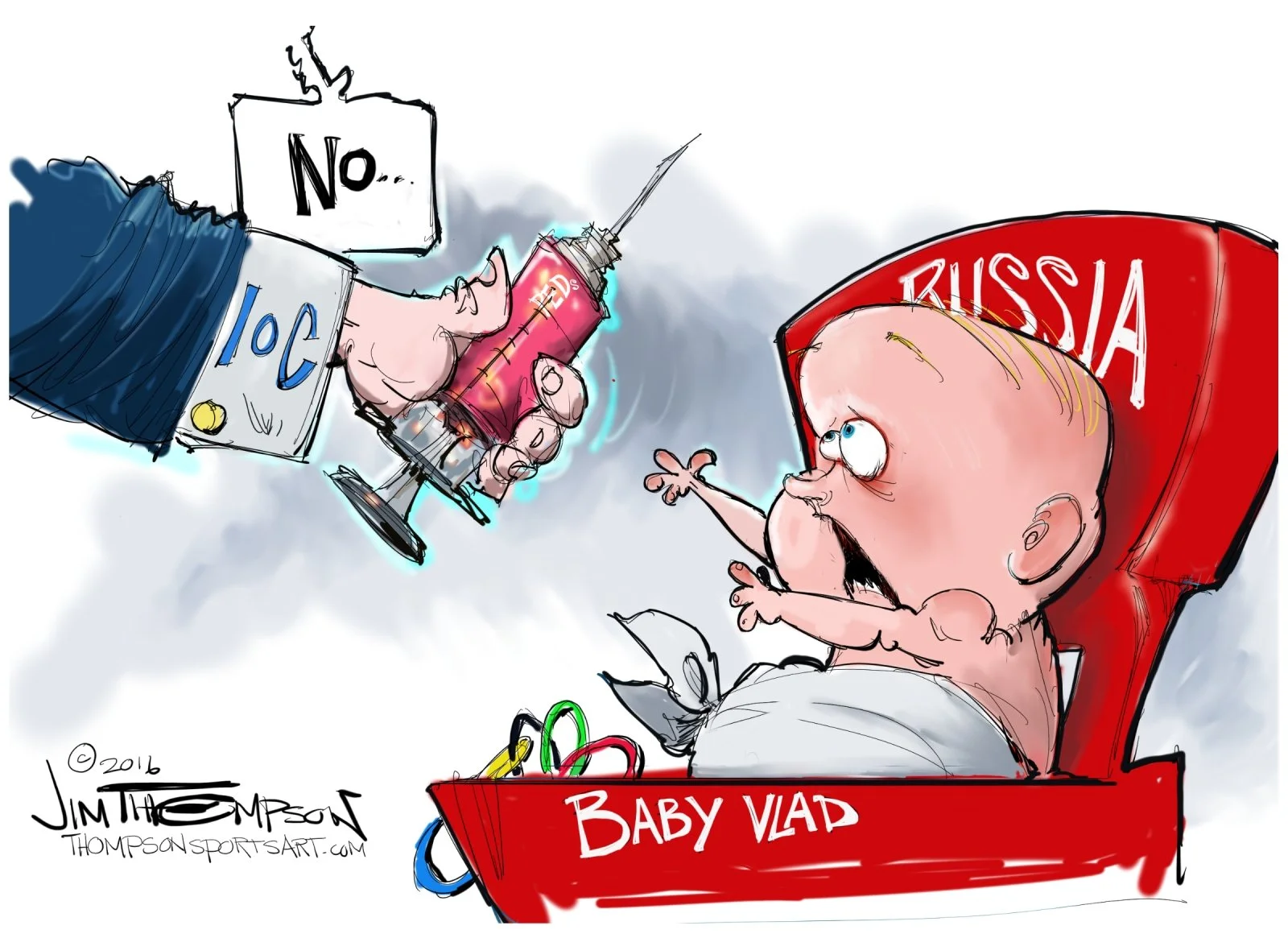Michael Payne, the International Olympic Committee’s former marketing director, and I like to use the same phrase for the chicken-little hysteria that besets far too much of the reporting, particularly in the western media, and especially the American press, in the days and weeks immediately preceding an edition of a Games.
It’s ‘FUD’ — fear, uncertainty and doubt.
Part of this is because the International Olympic Committee does such a tremendously poor job of telling its story — which ought to the easiest story in the world to tell, of the celebration of humanity — and, as a corollary, the story of its history.
Every institution has ups and downs. Olympic history, for sure. When the IOC makes itself as easy to beat as a piñata, of course people are going to take aim.
For all the countless words devoted over more than a century to Olympic history, perhaps no volume better tells the story of what truly is, and has been, what’s what about the Games and the IOC than Payne’s take, Toon In!, a collection of incredible editorial cartoons accompanied by his insightful and often first-hand analysis.
Beijing will mark Payne’s 21st Games in a row — an unbroken string since Sarajevo 1984.
Payne released Toon In! last spring, before the Tokyo Games. I’ve held off on writing about it, deliberately, because the thing is so long, 500 pages, and has so much in it, 1200 Olympics-related cartoons, drawn by some 400 different cartoonists, dating to the 1930s.
Michael Payne with ‘Toon In’
Disclosure: Payne and I have known each other for nearly 25 years. What Toon In! is not is what Payne, in his typical style, has sought to brand the book as: “a very unofficial & totally unsanctioned Olympic history, that media are describing as provocative, edgy, hysterical, riveting, scandalous & possibly libelous.”
Breaking this down: for sure unofficial and unsanctioned, provocative, edgy, at times very funny, throughout riveting but for sure not scandalous and 100 percent not libelous.
With apologies to those who have written Olympic histories, and I have read many, almost all are — let’s use the word turgid.
Or academic.
Toon In! is the farthest thing from.
The only ‘bad’ thing about Toon In! is that, of course, Payne is now going to have to update it wih Tokyo 2020 and Beijing 2022. The first postponed Games, ever. The first city to stage the Winter and Summer Games — and, of course, it being China. So much more in the update — to come, surely.
As for this first edition:
“It’s a formidable piece of work, illustrating a range of cynical views, for those who understand the Olympic movement over many years,” said Craig Reedie, the longstanding IOC member of many years (just became an honorary member) and former World Anti-Doping Agency president.
Formidable, yes, but written in a way and a style that makes plain what needs to be said.
In describing the Sochi Games, for instance, Payne rightly zeroes in for instance on the punk group Pussy Riot, released from custody days before the start of the 2014 Games. A challenge: find another Olympic history book that identifies this episode in Olympic and geopolitical history. Or uses the words “Pussy Riot.”
In the chapter on 2016. Payne, encapsulating the dilemma that was the cluster that Rio always was going to be: “Bidding for the Olympic Games and delivering the Games requires two very different management sets. Unfortunately, Rio’s leadership never understood that.”
Jim Thompson // USA
More Rio, on the sewage that fed directly into Olympic venues: “Shit happens.”
Pyeongchang 2018, and prospects for a united Korean team: “The general view in Washington was that Kim [Jong Un] was a madman, a crazed dictator who could not under any circumstances be allowed a finger on the nuclear button … Kim responded, denouncing Trump as ‘a mentally retarded dotard,’ promising ‘thousand-fold revenge against the U.S.,” Payne noting several paragraphs later, “Once again, the IOC was being sucked into Cold War politics, with no obvious way out.”
How did this all end? With the North Koreans at the party, as we all know. But: “Sanctions against North Korea even prevented its athletes from receiving a phone given to all athletes from TOP sponsor Samsung.”
And, in a nod to what’s coming in a few weeks in Beijing, in a chapter called, “Who Needs VIPs?” there’s a recitation of then-Vice President Mike Pence’s appearance, as part of the official American delegation at the 2018 Games.
The Americans have announced an official diplomatic boycott of the Beijing Games. In PyeongChang, as Payne writes of Pence, “[E]very action he took, or didn’t take, was designed to send a clear signal of his disapproval of what was going on. His opposition to the reception and welcome to the North Korean delegation was typical. In truth, it was Pence who became the bad-tempered fox in the hen house.
“… [F]or all of Pence’s efforts to keep North Korea from stealing the show at the Games, the images of the two Koreas marching together and their officials shaking hands proved impossible to frustrate. The North was welcomed with open arms to what South Korean President Kim Jae In called ‘the Olympic Games of Peace.’
“The U.S. had been left out in the cold. Actually, it had locked itself out, much to the discredit of the incumbent in the White House.”
Jim Thompson // USA
There’s more, so much more, in Toon In!: thoughts on the ancient Games as well as insights on modern matters, including doping (Russian and otherwise), the complicated American relationship with the Olympics and the IOC, boycotts, television rights, the facts and fictions of Olympic finance (almost no one in the world is better positioned to explain).
And more still.
When I first started covering the Olympic scene in the late 1990s, my learning curve was absurdly steep. The Olympic landscape is difficult to comprehend — there is the IOC but there are also hundreds of national Olympic committees and thousands of national governing bodies. Dozens of international sports federations, hundreds of national federations. And then there are continental federations. Anti-doping institutions. Government sports ministries. Governments themselves. Olympic bid committees. Organizing committees.
And more.
Sport and politics are of course interwoven. The current IOC president, Thomas Bach, made this crystal clear in a speech he gave early in his presidency, in South Korea, in 2014. To pretend otherwise is just silly.
Sport is a vital part of our world — all the more vital in these first years of the 21st century.
What Toon In! makes clear is how vital the Olympics are, and remain. For all the flaws of the Olympic movement, and there are many, there’s a reason nearly half the world tunes in to the opening ceremony of the Summer Games.
The cartoons in Toon In! not only make the prose go that much faster — they illustrate and amplify Payne’s often on-point analyses.
Payne quotes Kofi Annan, the former United Nations secretary general and Nobel Peace prize winner, in a forward of sorts to the book: “Cartoons make us laugh. Without them, our lives would be much sadder. But they are no laughing matter; they have the power to inform, and also to offend.”
Which is totally OK. That’s the point. To make us think — and learn.
“Olympic studies” is a field not often pursued in the United States. With the LA Games suddenly just six years away, Toon In! offers an opportunity. This book should be in every library — particularly every middle school and high school — in the United States.
It’s not as if Payne is making money on Toon In!, or I’m sucking up by writing this review — after all, I waited months to write and, besides, proceeds from the book go to four charities.
The point is this: if you care or want to know about the real story about the Olympics and the IOC, Toon In! should be required reading. About how and why the Games came to be, and why so many billions around Planet Earth genuinely care.
Still.
As they did in eternity, as they do in our modern times.
Take it from Payne’s chapter about Rio. You know, since he brought it up — shit matters.




